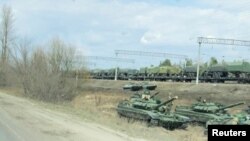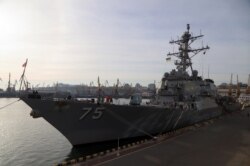The United States is accusing Russia of hiding the true intent of its military buildup along the border with Ukraine following consultations with allies about heightening tensions in the region.
U.S. officials declined Friday to share specifics on the number or types of Russian forces they have seen massing near Ukrainian territory. But they described Moscow's actions as both provocative and destabilizing, rejecting assertions that any movement has been tied to simple military exercises.
"We don't think that the Russians have been totally transparent about what they're doing," Pentagon press secretary John Kirby told reporters Friday.
"It is a big buildup … the biggest one that we've seen since 2014," he said, noting that similar previous buildups of Russian military force have not ended well for Moscow's neighbors.
"It's a history, a way of operating that we've seen from the Russians in many places, and we are certainly aware of that history," Kirby said, referencing Russia's seizure and annexation of Ukraine's Crimea in 2014.
"That's one of the reasons why we're watching this very, very closely," he said.
At the White House, press secretary Jen Psaki said the U.S. was busy working with partners and allies to assess the situation and what can be done to lower tensions.
"There's ongoing diplomatic engagement between us and a number of countries in the region, including Russia," she said.
Psaki declined to elaborate on the diplomatic efforts, but Germany and France added their voices to the chorus of countries seeking to get Moscow to back down.
"#Russia must de-escalate & act transparently with regard to its troop movements," German Foreign Minister Heiko Maas said on Twitter, following talks with U.S. Secretary of State Antony Blinken. "Together with our #EU & #NATO partners we will monitor further steps closely."
French Foreign Minister Jean-Yves Le Drian likewise called on Russia to "cease its provocations" and take action to ease tensions "with no delay."
So far, such calls seem to have made little impact. Russia on Friday defended its actions while insisting it is Ukraine that is responsible for the heightened tensions.
"We are free to move our armed forces and any units across the territory of Russia at our discretion," Kremlin spokesman Dmitry Peskov said.
"Ukraine is turning into a potentially very unstable region again. Any country that has an unstable, explosive region near its borders surely takes the necessary measures to ensure its own security," he added.
In the meantime, Russia's deputy foreign minister appeared to raise concern over reports the U.S. is sending two warships to the Black Sea in a show of support for Ukraine.
"The number of visits by NATO countries and the length of the stay of (their) warships have increased," he told Russia's Interfax news agency.
Turkish officials said Friday that the U.S. would be sending two ships to the Black Sea next week (April 14-15) and that they would remain there for approximately two weeks.
U.S. defense officials declined to confirm the Turkish statement but said such operations are routine.
"We routinely operate in the Black Sea," Kirby told reporters at the Pentagon.
"We will fly, sail and operate wherever international law permits us to do so. That's what this is about, and, clearly, we take our obligations throughout the European area of operations very, very seriously," he added.
Earlier this week, Ukrainian President Volodymyr Zelenskiy urged NATO to allow the country to join the alliance to send Moscow a message and end fighting in the Donbas region, where Russian-backed separatists have been battling with Ukrainian forces since April of 2014.
Some information for this report came from Reuters.






